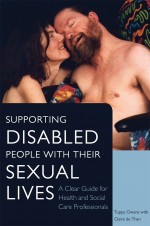Sex and disability
by Bruce AbrahamsWhen asked toward the end of his life if he had any regrets, the poet John Betjeman famously replied ‘not enough sex’. Few of us I suspect, would think we have too much sex and surveys are unreliable measures. But it is a safe bet that for most people our sex lives cluster around some median range of frequency and satisfaction; although there will be outliers on the frequent and great or rarely and disappointing spectrum. Overall however, society’s preoccupation with sex acknowledges that we humans are predisposed to find sex attractive and pleasurable in prospect and often (if sadly not often enough) in practice.
How lucky most are then to have sex at all. There are those for whom physical intimacy of the sensual kind is a remote fantasy.
Dr Rosalind ‘Tuppy’ Owens has made it her life’s work to support physically or socially disabled people in their desire to enjoy intimate relationships and experience sexual pleasure. Her foundation of charitable organisation The Outsiders (1979) and campaigning group SHADA (the Sexual Health and Disability Alliance) in 2005 have been seminal in bringing the sexual needs of the disabled into focus as a largely neglected aspect of medical and social care.
Dr Owens has brought her personal commitment and wide experience to bear in her latest book, Supporting Disabled People with their Sexual Lives. This is a work that does what the title suggests. In her inimitable style Tuppy tells personal carers – whether family or volunteer practitioners – and all health professionals who have disability care in their remit what they should do to recognise and properly ‘come to terms with’ the needs of their loved ones, clients or patients; and to assist them to find ways to experience intimate physical pleasure.
The message ultimately is that while sex starts in the head it needs physical expression. Sex is about a sense of self and its apotheosis is in the sensations associated with a body that may be damaged but which still feels. Because sex is associated so closely with youth and beauty, it is pretty hard for most of us even to contemplate desire in the elderly let alone someone in a wheelchair. Physical incapacity is assumed to include absence of desire. It doesn’t. Carers and professionals need to recognise the importance of pleasurable physical intimacy in the health of those they work with, understand the various ways the needs can be met and work together to support the delivery of good experiences. It may involve helping two people to ‘get it together’. Or it may be about facilitating privacy in the use of erotica or aids to stimulation. And it may require finding a willing third party to provide a service on a fee-paying basis.
Fortunately, there are many sex workers who are glad to provide services to disabled people. Less luckily there is a growing campaign movement that is determined to criminalise sex worker clients on the basis of very partial and ill-considered evidence of the risks to and protection of sex workers themselves. One hopes that some dispensation can be engineered, but there is a real danger that a moral crusade will make an already disadvantaged group even worse off. Carers and practitioners too would also be inhibited from providing full support.
Given the subject matter, and despite Dr Owen’s candid and engaging style this is a serious and challenging text that breaks new ground in our understanding of disability. It is one however, that everyone with a personal or professional interest in the welfare of the seriously disabled should study and keep on their shelves.
Supporting Disabled People with their Sexual Lives, Tuppy Owens with Claire de Than, published by Jessica Kingsley, ISBN 978-1-84905-396-9; paperback £18.17 Kindle £16.29


